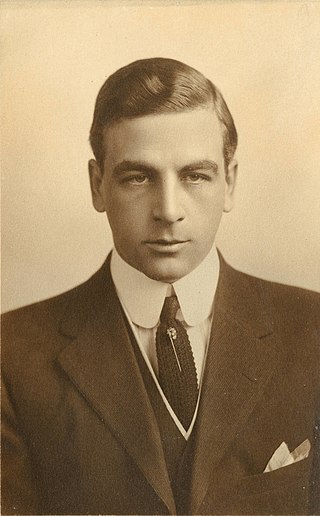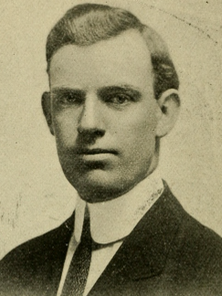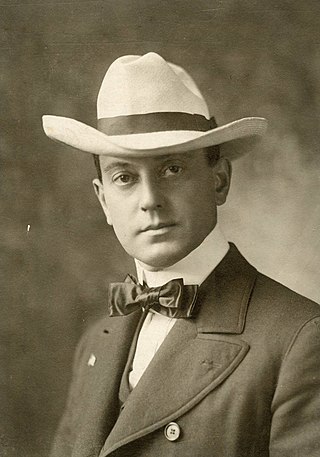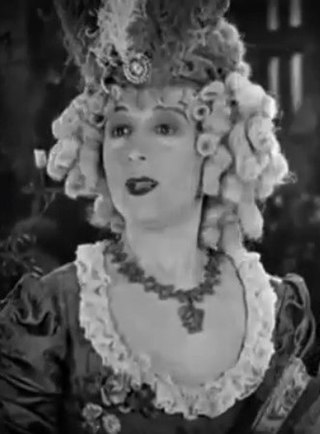Related Research Articles

Milton George Gustavus Sills was an American stage and film actor of the early twentieth century.

Mollie McConnell was an American silent film actress.

Edward Francis McLaughlin was an American politician from Boston.

James Gordon was an American silent film actor. He appeared in more than 120 films between 1911 and 1935. He also directed 4 films between 1913 and 1915, including the 1915 film The New Adventures of J. Rufus Wallingford.

William Effingham Lawrence was an American actor of the silent era. He was born in Brooklyn, New York and died in Los Angeles, California. Known by the nickname "Babe", Lawrence appeared in 120 films between 1912 and 1947. Before entering the movie industry, he was an artist's model.

Joseph Edward Victor Fairfield Daveran Singleton was an actor of the silent era. An Australian, he appeared in 74 films between 1913 and 1925. He was born in Melbourne.

Harvey Thornton Clark was an American actor on stage and screen. He appeared in more than 200 films between 1915 and 1938. He was born in Chelsea, Massachusetts, and died in Hollywood, California, from a heart attack.

James F. Neill was an American stage actor and film actor of the silent era. He appeared in more than 110 films between 1913 and 1930.

James Colin Campbell was a film director, actor and screenwriter. He directed more than 170 American films between 1911 and 1924; and wrote scripts for 60 films between 1911 and 1922. He was born in Scotland, and died in Hollywood, California.

Charles Wyndham Standing was an English film actor.

Edward José was a Belgian film director and actor of the silent era. He directed 42 films between 1915 and 1925. He also performed in 12 films between 1910 and 1916.

James W. Morrison was an American actor and author. He appeared in 187 films between 1911 and 1927.

Floyd Martin Thornton was an American screenwriter and film director active in the United Kingdom in the 1910s and 1920s. He also directed films for the Natural Color Kinematograph Company.

Our Mrs. McChesney is a lost 1918 American silent comedy-drama film produced and distributed by Metro Pictures, directed by Ralph Ince, and based on the 1915 play by Edna Ferber and George V. Hobart starring Ethel Barrymore.

William Riley Hatch was an American singer and actor on stage and in silent films.

F. McGrew Willis was an American screenwriter of the silent and early sound film eras. Born Frank McGrew Willis on August 18, 1891, in Pleasanton, Iowa, he broke into the film industry writing film shorts in 1914 and 1915 as a freelance screenwriter. His first feature credit came in 1915, with The Quest, the first of three features he would pen in 1915. Over the next fourteen years he would write the scripts or stories for 43 silent films, three of which, The Girl in the Pullman (1927), Annapolis (1928), and A Blonde for a Night (1928), he also produced for either De Mille Pictures and/or Pathé Exchange. He would also produce another three films in 1928. In 1929, and through the next 6 years of the blossoming talking picture era, he would write the screenplays or stories for another 18 films. In the late 1930s he would work in England, where he scripted 6 films during the remainder of the decade. His final screenwriting credit would come on 1941's Sis Hopkins, for which he wrote the story. Willis died on October 13, 1957, in Menlo Park, California, and was buried in Mountain View Cemetery in Oakland, California.

Clarissa Selwynne was a British stage and film actress. She settled in the United States, working in Hollywood where she appeared in around 100 films.
Henry Lyman Broening was a well known American cinematographer. Later, he was also on the editorial board of American Cinematographer magazine. He worked on films that include May Blossom (1915) and wrote about the beginnings of the ASC.
William Ewart Fildew, billed as either William Fildew or William E. Fildew, was an American cinematographer during the silent film era. He shot 54 films between 1915 and 1927. His first film was 1915's The Lost House, directed by Christy Cabanne and starring Lillian Gish. That same year he also shot Martyrs of the Alamo, directed by Cabanne, which was the first film in which Douglas Fairbanks appeared. Fairbanks' first starring role, also in 1915, was The Lamb, which Fildew also shot. His final film was The Wreck, directed by William James Craft and starring Shirley Mason and Malcolm McGregor.

Alberta Lee (1860–1928) was an American stage and film actress of the silent era. In 1915, she appeared as Mary Todd Lincoln in The Birth of a Nation.
References
This article includes a list of references, related reading, or external links, but its sources remain unclear because it lacks inline citations .(June 2024) |
This article relies largely or entirely on a single source .(June 2024) |
- American Film Institute. The American Film Institute Catalog of Motion Pictures Produced in the United States Part 1, Volume 1. University of California Press, 1971.